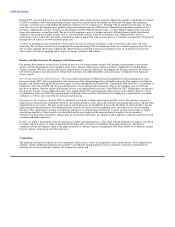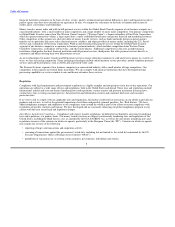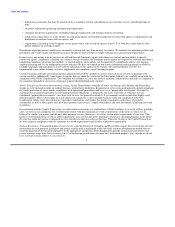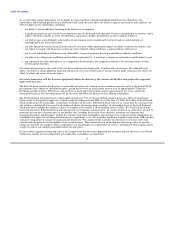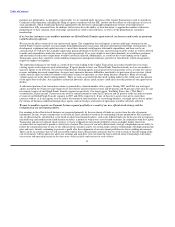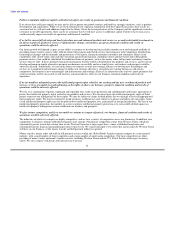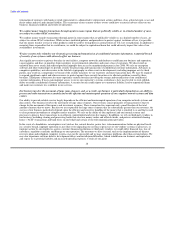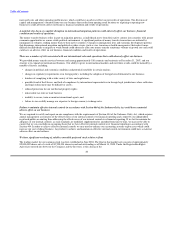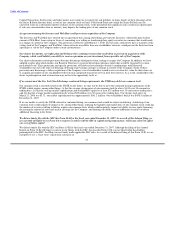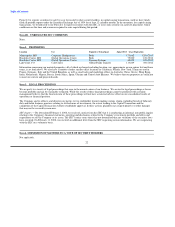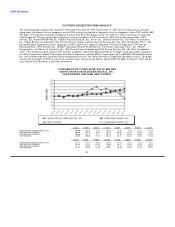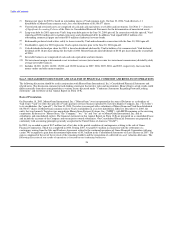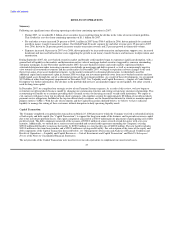MoneyGram 2007 Annual Report Download - page 20
Download and view the complete annual report
Please find page 20 of the 2007 MoneyGram annual report below. You can navigate through the pages in the report by either clicking on the pages listed below, or by using the keyword search tool below to find specific information within the annual report.
Table of Contents
money transfer service providers that serve select send and receive corridors. The electronic bill payment services within our Global
Funds Transfer segment compete in a highly fragmented consumer- to-business payment industry. Competitors in the electronic
payments area include financial institutions, third parties that host financial institution and bill payment services, third parties that offer
payment services directly to consumers and billers offering their own bill payment services. Competitors of PropertyBridge Inc.
("PropertyBridge"), our wholly owned subsidiary, include the providers of electronic bill payment services discussed above, as well as
companies focusing solely on the rent payment vertical, companies focusing on multiple payment verticals, including rent payments, and
providers of property management software.
Our Payment Systems segment competes in a concentrated industry with a small number of large competitors. Our competitors in this
segment are federal home loan banks. We also compete with financial institutions that have developed internal processing capabilities or
services similar to ours and do not outsource these services.
Recent levels of growth in consumer money transfer transactions, bill payment transactions and other payment products may not
continue. In addition, consolidation among payment services companies has occurred and could continue. If we are unable to continue to
grow our existing products, while also growing newly developed and acquired products, we will be unable to compete effectively in the
changing marketplace, and our business, financial condition and results of operations would be adversely affected.
MoneyGram and our agents are subject to a number of risks relating to U.S. and International regulatory requirements which could
result in material settlements, fines or penalties or changes in our or their business operations that may adversely affect our business,
financial condition and results of operations.
Our business is subject to a wide range of laws and regulations which vary from country to country. The money transfer business is
subject to a variety of regulations aimed at the prevention of money laundering and terrorism. We are subject to U.S. federal anti-money
laundering laws, including the Bank Secrecy Act, as amended by the USA PATRIOT Act, the requirements of the Office of Foreign
Assets Control ("OFAC"), which prohibit us from transmitting money to specified countries or on behalf of prohibited individuals and the
anti-money laundering laws in many countries where we operate, particularly in the European Union. We are also subject to financial
services regulations, money transfer and payment instrument licensing regulations, currency control regulations, escheat laws, laws
covering consumer privacy, data protection and information security and consumer disclosure and consumer protection laws. Many of the
laws to which we are subject are evolving, unclear and inconsistent across various jurisdictions, making compliance challenging.
Any intentional or negligent violation of the laws and regulations set forth above by our employees or our agents could lead to significant
fines or penalties, and could limit our ability to conduct business in some jurisdictions. In addition to those direct costs, a failure by us or
our agents to comply with applicable laws and regulations also could seriously damage our reputation and brands, and result in
diminished revenue and profit and increased operating costs.
In connection with the Capital Transaction, we sold certain investments at a realized loss of $260.6 million. As a result of these portfolio
sales, we were not in compliance for a brief period of time with the minimum net worth requirements of the states in which we are
licensed to conduct our money transfer and other payment services businesses, as well as certain other requirements of one state. This
failure to meet minimum net worth or other requirements may result in the states imposing certain fines and other penalties in the future.
Changes in laws, regulations or other industry practices and standards, or interpretations of legal or regulatory requirements may occur
which could increase our compliance and other costs of doing business, require significant systems redevelopment, reduce the market for
or value of our products or services or render our products or services less profitable or obsolete, and have an adverse effect on our results
of operations. Changes in the laws affecting the kinds of entities that are permitted to act as money transfer agents (such as changes in
requirements for capitalization or ownership) could adversely effect our ability to distribute our services and the cost of providing such
services, both by us and our agents. If onerous regulatory requirements were imposed on our agents, the requirements could lead to a loss
of agents, which, in turn, could lead to a loss of retail business.
Failure by us or our agents to comply with the laws and regulatory requirements of applicable regulatory authorities could result in,
among other things, revocation of required licenses or registrations, loss of approved status,
17


